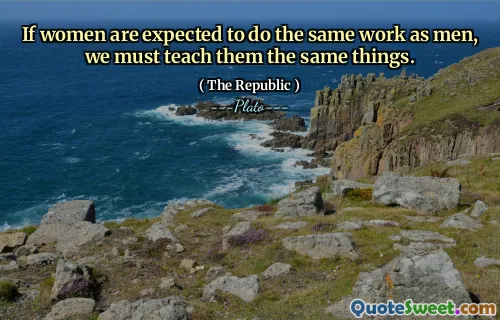
If women are expected to do the same work as men, we must teach them the same things.
📖 Plato
This quote from ---Plato---'s The Republic presents a progressive and enduring truth that remains relevant in contemporary discussions about gender equality and education. It underscores a fundamental principle: equality in responsibility requires equality in preparation and opportunity. The assertion that women should receive the same education as men if they are to undertake the same work challenges deeply ingrained societal biases and traditional gender roles.
The context of the quote invites us to consider not only the importance of equal access to education but also how systemic structures can perpetuate inequality by limiting knowledge and skills based on gender. By proclaiming the need for identical instruction for both men and women, Plato aligns with a vision of fairness built upon meritocracy and capability rather than gendered expectations. It interrupts the narrative that intellectual development and professional competence are exclusive to men and highlights education as the essential equalizer.
Reflecting deeper, this perspective stimulates a broader conversation about the mechanisms that enforce gender disparities in all spheres of life—from education to employment and societal recognition. It evokes the recognition that without equitable educational foundations, such as curricula inclusive of varying perspectives and opportunities for skill-building, women are effectively barred from pursuing their ambitions on an equal footing.
Moreover, the quote carries implications about how societies envision roles, professions, and contributions. It calls for a reconsideration of educational policies and cultural attitudes that segregate learning experiences, which in turn dictate access to certain careers and leadership roles. By advocating for identical teaching, it fosters inclusivity and diversity, laying the groundwork for a society where gender no longer defines one's potential or limitation.
Finally, the quote is a reminder of the responsibility of educators, policymakers, and society to reflect critically on who is being given knowledge and encouragement and to recognize that equal preparation is not just a right but a necessity in striving for equality itself. It champions empowerment through education as the gateway to equal participation in national and civic life.
In summary, Plato’s statement from The Republic resonates across centuries as a call for fairness, respect, and practical equality. It serves as both a challenge and a guidepost toward reshaping educational frameworks to embrace inclusivity, thereby enabling all individuals, irrespective of gender, to contribute meaningfully and equally to the world's intellectual and practical endeavors.






